Well here were are again, propitiating the Gods of Halloween with another round of me scribblin’ down some thoughts about some of the best weird fiction ever published in Weird Tales. We’re still hanging out in the strange world of the latter half of the magazine’s run, this time with a story by the great Robert Bloch, “Notebook Found in a Deserted House.” Before we get to it, however, I do wanna give ya’ll a little heads up about a bit of unpleasantness in this story: at some point about half-way through or so the character transcribes a phonetic version of one of those classic Cthulhu cultist chants (you know, “Iä! Cthulhu ftagn,” things of that sort). Well, this chant in particular is to the Lovecraftian entity Shub-Niggurath, and the transliteration of the name includes the n-word. Now, it’s not being used as a racist slur but still, it’s kind of a shocking thing to just roll up on in the text, so be prepared.
Importantly, Bloch himself was emphatically and actively NOT a racist, something worth noting for both his time AND his role as a part of the Lovecraft Circle. Bloch’s parents ran a refugee resettlement house in Milwaukee, and there are numerous examples of Bloch taking explicitly anti-racist and anti-imperialist stances in his writing – there’re lots of characters who get called out for casual racism in his stories, he used evil KKK/racist groups as villains fairly often, and even wrote a weird sci-fi story explicitly condemning Apartheid in South Africa in 1960 – he was clearly of a progressive bent, an interesting counterpoint to his friend and mentor Lovecraft, who was of course a virulent racist. Why he decided to codify the pronunciation of what surely must be the unpronounceable name of an alien god thing in that particular way is a mystery.
Anyway, on to this issue’s Cover!

Yep, ol’ Bloch got himself the cover this issue by Lee Brown Coye, who did a number of covers for Weird Tales in the 40s and 50s. Generally I enjoy his work, although this one kind of leaves me a little cold, honestly. I dunno why, exactly; could just be the kind of blandly spookified house there. I kind of like the strange, ghostly figure in the sky, though, and if you envision the house and the little bearded guy as being a child’s drawing, maybe it’s better? Still, not my favorite of Coye’s work, but good on ol’ Bloch getting the cover this issue.
Interestingly, Coye got the Weird Tales work because he did some covers for August Derleth’s Arkham House anthologies that were quite spooky and good. I’ve actually got one from the 60s that Coye did the cover for, “Dagon and Other Macabre Tales,” and I think shows his talents off much better:

But back to Weird Tales! Here’s this issue’s ToC:
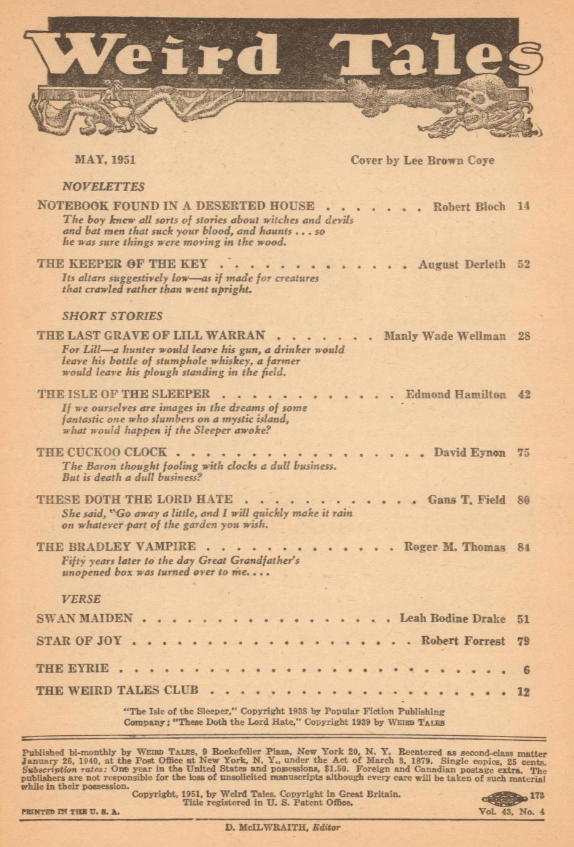
Not a bad list of stories – the Manly Wade Wellman is fun, one of his Appalachian stories that he’s so good at. The other thing to point out is how McIlwraith kept Weird Tales‘ dedication to publishing poetry going strong under her tenure, an underappreciated part of the history of weird fic, in my opinion. Oh, and also worth noting is how the magazine has slimmed down in these later issues: a scant 80 some pages every OTHER month, rather than the 100+ pages every SINGLE month of the previous era. C’est la magazine publishing, i guess!
And with that, let’s get into the story!
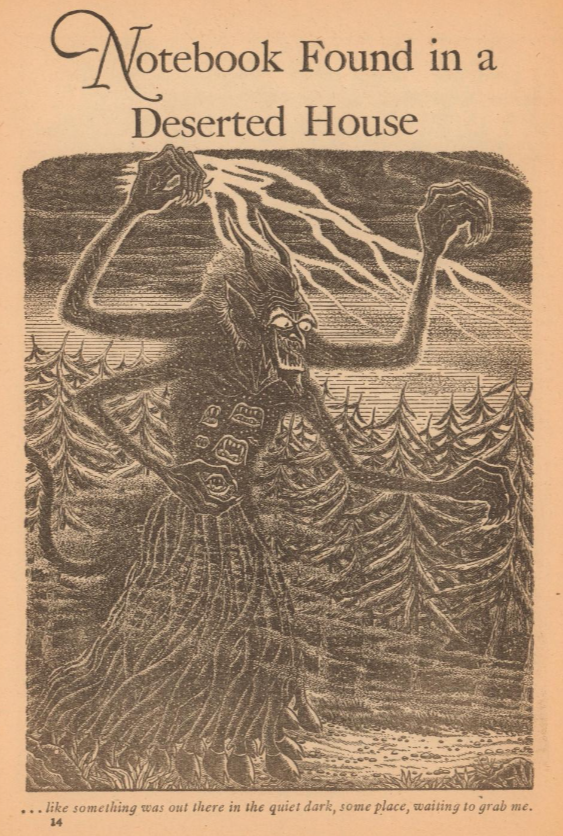
Full page title image, and holy smokes what a great monster! I really love this kind of old school comic style critter; again, this thing wouldn’t be out of place among the very DIY horrors from the original Dungeons and Dragons Monster Manual, you know what I mean? Mouths all over the torso, hooves AND tentacles, and I actually like the incongruously humanoid devil-head – it’s all that much weirder for having a recognizable noggin, you know what I mean? This piece of art is by Matt Fox, a VERY obscure illustrator who did a lot of internal art for Weird Tales, and I think it’s great!
Bloch makes fun use of the title, integrating it directly into the narrative. It’s a no-frills and, importantly, almost non-informative title, and that’s interesting to me. Of course there’s a long history of outré lit using this kind of metafictive titling scheme – The Narrative of Arthur Gordon Pym, Manuscript Found in a Bottle, The Statement of Randolph Carter, etc., all of them presenting the story as a document rather than a story. What’s interesting about this one is that there’s very little context given in this title; you know what you’re going to read is a text from a notebook found in a deserted house, and THAT’S IT. How old is the notebook? How long has the house been deserted? Where’s the house? All of that is kept from you, and that’s great.
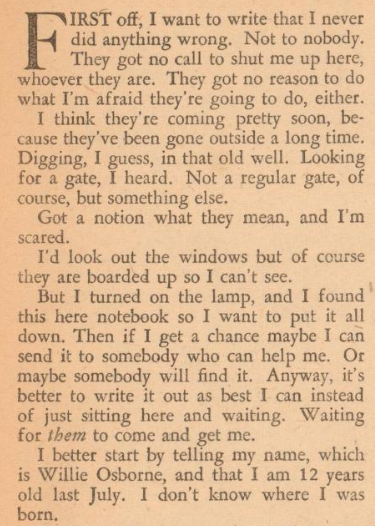
And the story is true to its title – no preamble, no “this document was found among the blah blah” stuff, it’s right off the bat BAM: the notebook. And the tone and voice is great right away – the aggrieved, almost plaintive, statement that whoever is writing this ain’t never did nothin’ wrong. It’s very folksy and almost childlike, which is appropriate because we learn a little ways in that the writer of this notebook is, in fact, a child, Willie Osborne, age 12 last July. And he’s in some deep shit.
He’s been trapped by some “them” out there, and “they” have got some kind of hunt on for a gate which, if you ever find yourself in a horror story among people looking for a gate, you know you’re in for some trouble. This is just good spooky writing that plays to Bloch’s great strength, which is writing in a distinct voice in the first person. He gives lil’ Willie here a strongly realized characterization right off the bat with the way he writes and thinks. As for HORROR, it’s great, because we know from the title that despite Willie’s hopes, no help is going to be forthcoming, and this document he’s writing is going to be found in a deserted house long after he’s met his doom. It’s actually pretty chilling stuff!
Willie continues with his short little biographical sketch, explaining how he’d lived with his Grandma way out in the sticks, and how she’d tell him about them ones that lived even wayer outer in the real, deep wilderness.
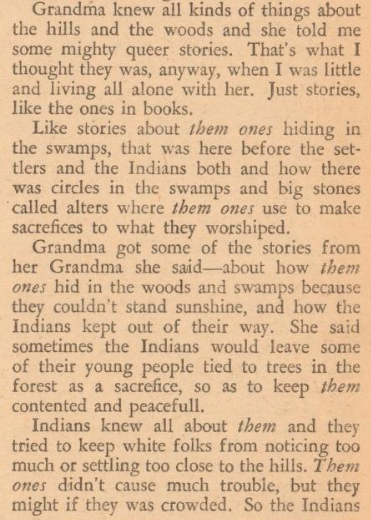
The Indians by and large kept people away from this region full weirdos, and even to this very day there are only a few isolated farmsteads and such. And, it turns out, among the yeomanry hangin’ out in the strange zone are some of Willie’s relations, Uncle Fred and Aunt Lucy. And when Grandma kicks the bucket, Willie gets sent to live with them, the lucky little so-and-so.
Willie has a fun trip on a train, meets his Uncle at the station, and takes a ride through the deep still woods and ominous quiet hills to the distant farmhouse of his Aunt and Uncle. It’s an unsettling ride, because of course Willie’s Grandma told him all sorts of strange and unpleasant stories about the woods and the hills, but also because Uncle Fred seems a little scared to be in the woods himself – he drives the horse hard, like he’s trying to spend as little time out in there as possible.
A year goes by, and it sounds like a lonely one – the farm is miles from any neighbor, and they never go into town for supplies or anything, living off the things the farm provides. At first Willie steers clear of the woods, but slowly he starts to grow used to it.
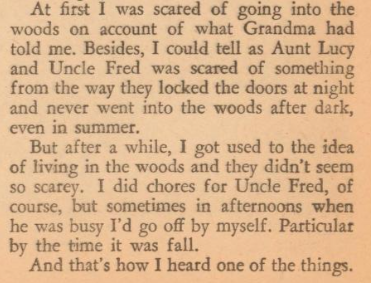
Yipes, right? Willie’s out in the woods, doin’ chores one October evening, when he hears something strange stirrin’ among the trees. Now, Willie has established already that these woods are strangely silent – few birds and no larger critters, so when he hears something that isn’t the mailman or his aunt and uncle, he gets spooked. He hides and listens.
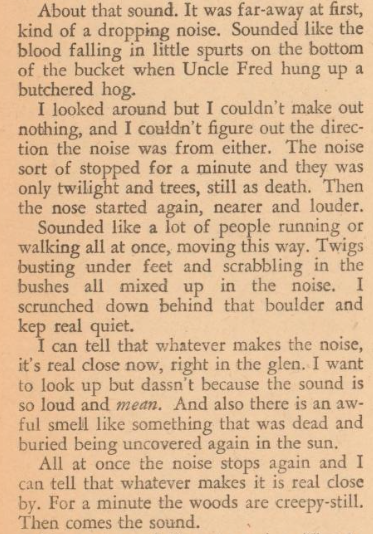
Good visceral writing of great, non-visual sensory horror, you know? The sound that reminds Willie of blood spattering in a bucket, the stench of death and decay, and the sense of it moving around, getting closer. He can’t see it, but the presence of the thing is felt strongly, isn’t it? Also, the scrabbling of lots and lots of feet, like a whole herd of people moving around. It’s spooky stuff, and then it gets worse!
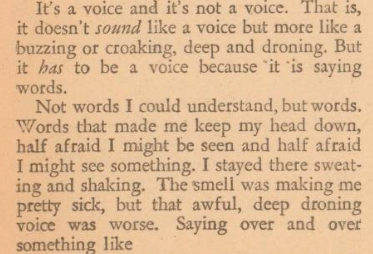
This is the part with the unfortunate transcription description, which we’ll avoid, but sufficed to say it’s a full on cthulhu style chant being croaked by some unearthly and inhuman voice. And as it’s speaking the smell is getting worse and worse, until finally Willie is overcome and passes out. Eventually he wakes; night has fallen.
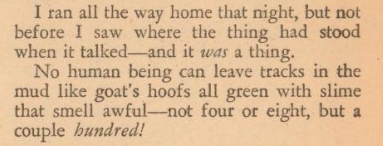
Weird voice chanting strange words, slimy hoofed tracks from a couple hundred feet…pretty good monster description, and it’s nicely strange and incomplete. Like Willie, we don’t have a clue what this thing looks like, but ye gods it must be weird as hell, right?
Back home, Willie doesn’t share his adventure with his aunt or uncle. However, he does get digging around in his aunt’s library – Willie doesn’t go to school, but his Aunt Lucy has been helping him do his reading in the evening, so it’s established that there’re a collection of books in the house. And, wouldn’t ya know it, Lucy happens to have a Mythos Book of the Month membership, because Willie finds a book that he thinks is relevant to all the shenanigans that’s been going on in the woods all these many thousands of years.
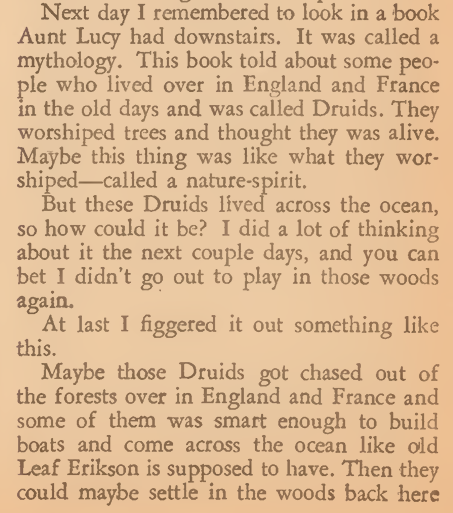
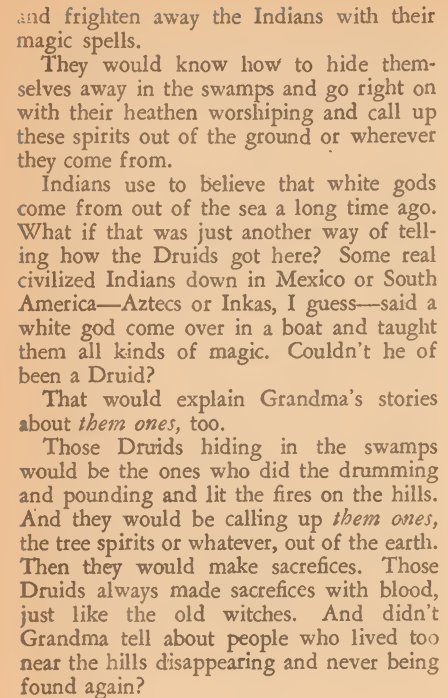
Willie must be some kinda comparative religion savant, the way he links Quetzalcoatl with some transatlantic Druids in the New England backwoods! At the very least, he deserves a show on the History Channel or something, alongside those “Did UFOs build the Pyramids” things. This is kinda the only false note in the story, and it’s funny to see this bad habit of overexplaining of Bloch’s (and a lot of other Lovecraftian writers, to be fair) still creeping in after all these years. Look, there’s a weird thing in the woods, there’re weird cultists, they’ve been there a long ass time…I don’t need it spelled out from the STRANGELY RELEVANT book in your aunt’s house, you know? Especially odd, because we’ve already established that Willie has a good grasp on the local lore from his Grandma. Like I said, it’s a weaker part, but oh well.
What he DOES remember from Grandma, though, is that Halloween time is the BIG time for them ones in the woods, and sure enough…it’s comin’ up!
The other thing that’s on the calendar is a visit from Cousin Osborne; there’s preparations and all, canning and carpentry in the disused spare room, and then one rainy day Uncle Fred hitches the buggy and rides the seven miles into town to get Cousin Osborne at the station. Willie is happy to stay home, since the woods are getting noisier and creepier every day.
Come afternoon though, Uncle Fred hasn’t returned. Maybe the train was late? But then it gets dark, so they go out to put a lantern by the gate. They hear some noises, it’s dark and spooky, and then suddenly the buggy appears, thudding along the road towards the farm. Aunt Lucy gives a sigh of relief…but…
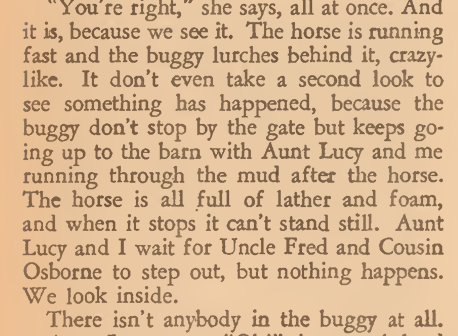
Lucy faints, and Willie has to get her inside on his own. The next morning the horse has died, making a trip in to the station or to a neighbor’s house a very daunting trek. Lucy, terrified of the woods, insists that they’ll just have to wait for Cap Pritchard the mail man to come by later in the week; they can hitch a ride with him into town then.
It’s a grim scene, and the sense of dread is really something, isn’t it? This empty buggy running in on its own, the horse exhausted enough to die afterwards, and Fred and Osborne just plain vanished, no word or sign of ’em at all! Spooky stuff!
And it just gets worse, because despite having Aunt Lucy there with him, Willie is basically on his own; something has broken in Lucy. She just sits rocking, muttering that “Fred had always warned her” about the woods. Willie makes all the meals, and keeps listening for the drums from the forest, trying to stay awake because he’s been having terrible dreams about monstrous things with snaky hooves legs and countless mouths, chanting deep in the woods. But despite it all, they make it through the week, and its the night before the mail man is scheduled to come.
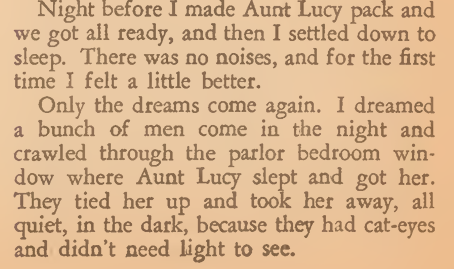
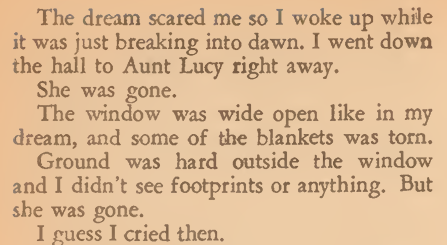
Rough times for lil’ Willie, huh? He decides he can’t wait around any longer, so that morning he collects a little money and gets the letter his cousin sent from Kingsport, and decides he’s going to walk to town and try to get help. But just as he’s about to leave, he hears footsteps from the road.
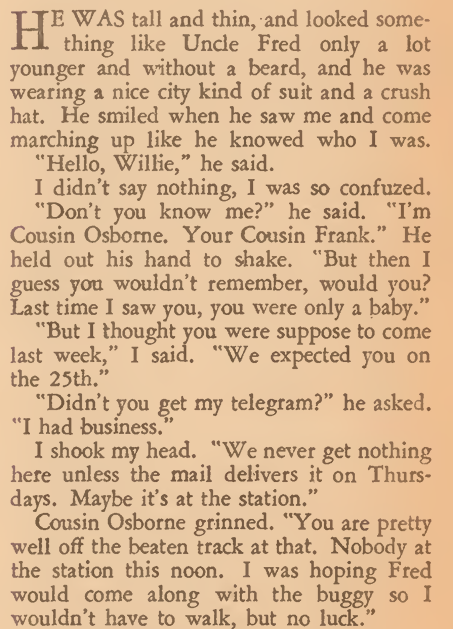
Ah, well, I’m sure everything is fine then, huh? Willie suspects something is off, though – where’s Cousin Osborne’s suitcase, for one thing (“oh, left it back at the station.”) But what’re you gonna do when you’re just a 12 year old kid? They head into the house and Willie tells his cousin most of what has happened, leaving out some of the stranger details, like what he heard in the woods that one time. Cousin Osborne agrees that it’s strange that Fred and Lucy have vanished, but that Willie mustn’t give in to these strange fancies about people in the woods and horrible monster, ha ha there young man, what an imagination you’ve got, why it reminds me of the nonsense I hear back in Arkham!
Waitaminute, says Willie, you live in Kingsport, don’t you Cousin Osborne. (Cut to cousin osborne pulling on his collar, saying “hamina hamina hamina”)
Willie still thinks they should go, but Cousin Osborne puts the kibosh on that plan. They hear a buggy coming up the road; it’s the mailman! Willie wants to run and meet him, but Osborne says no, you stay in here, I will go talk to him. Willie watches, and when the mail man starts to drive off, he runs out after him.
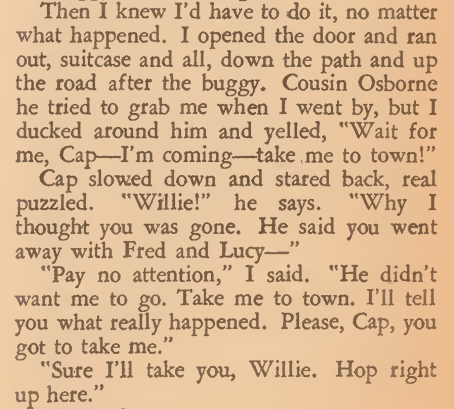
Osborne at first refuses, but in the face of Willie’s intransigence and the Mail Man’s skepticism, Cousin Osborne says fine, HE’LL come along too.
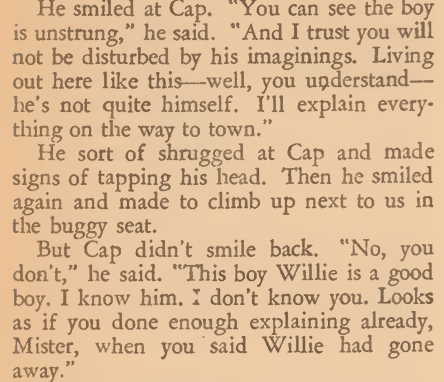
When he insists, Cap pulls a goddamn gun on him!

Cap ain’t fucking around!
They ride off, leaving an angry “Cousin Osborne” behind, and as they go Willie brings Cap up to speed. But it’s late in the day, and the woods are growing dark. A storm builds, there’s thunder and lighting, and something else…drums. The storm crashes over them, and they’re hurrying along in the rain and lightning. Cap has his pistol out, and Willie is trying to get answers from him about the things in the woods.
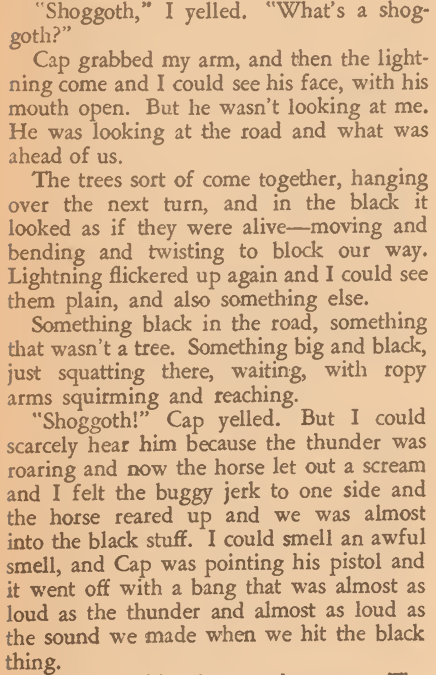
Willie is thrown from the buggy when they smash into the Thing squatting in the middle of the road. He runs, panicked, through the woods, and finds himself climbing a hill with a fire and an alter and lots of robed people with knives. He witnesses a horrible human sacrifice that summons something from the Hills.
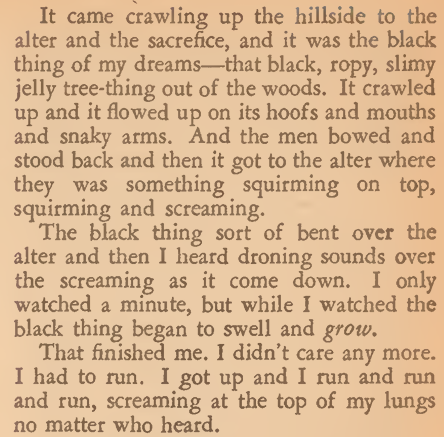
Willie flees screaming into the night and, through luck or instinct, finds his way back to the farm. Afraid of the storm and the night, he runs inside, finds his uncles tools, and boards up the windows and doors. He hopes he can wait it out and try to escape come dawn, BUT next morning “Cousin Osborne” is outside, calling for Willie. He tries the doors and windows, but Willie’s carpentry is sound and he can’t get in. Then he hears “Cousin Osborne” talking to something…something with a strange, droning, buzzing, inhuman voice.
Willie realizes that they know he’s there in the farm house…who else would’ve boarded it up like that. All he can do is try and wait it out and hope that someone, investigating the disappearance of Cap or the real Cousin Osborne, comes and helps him. That catches us up to the beginning of the story, when Willie found the notebook and began writing all this down.
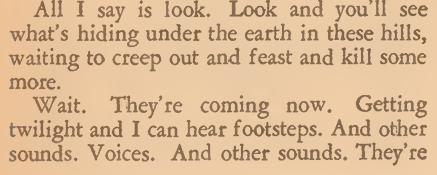
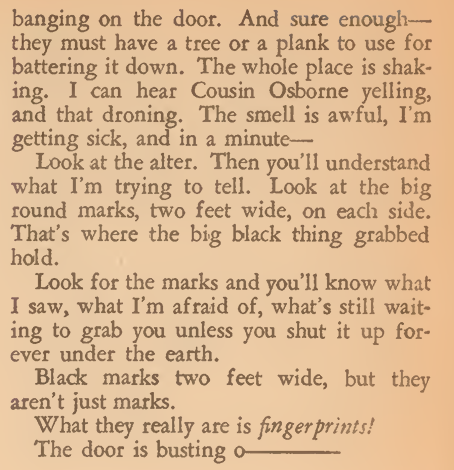
And that’s the End!
One of those famous weird fiction “I’m still writing this even as a horror is happening to me oh no it’s in the room argh it’s got me i’m being kil – ” sort of endings. Some people find those very silly, like the idea that you’d keep on scribbling away, and often times they CAN be a little odd, but I feel like this one works pretty good. Willie knows he’s trapped, he knows he’s not going to get away; he overheard the cultists planning to get him come dark, so all he can do is try and write everything down, leave some kind of record and warning for others. So it doesn’t bother me in that regard.
It’s a kind of lonely, grim story, and you really feel for poor ol’ Willie, trapped there, everyone he knows dead at the pseudopods of something awful. As far a Lovecraft homage go, I think it’s a pretty effective – it draws on a lot of the themes and styles of Lovecraft, but it diverges enough to keep it interesting, and making the narrator a little kid helps to break up what would otherwise be a fairly run-of-the-mill pastiche. I mean, if the main character was like a professor or an antiquarian, or even just an adult, I think this story wouldn’t work at all. It’s the helplessness of a child that makes this story interesting.
Bloch would eventually leave his Lovecraftian days behind him, finding his voice more in the psychologically twisted slashers-and-murderers kind of horror. But it is neat to see him, even as late as the 50s, still going back to the Lovecraftian fiction that he started with, way back in the 30s. Bloch, of course, began as a READER of Weird Tales first, writing letters to the editor and becoming something of a senior fan before trying his hand at fiction. His earliest attempts are straight Lovecraft mimics, and he would work in that vein (with varying success) on and off for much of his early career. “Notebook Found in a Deserted House” is interesting because, while it draws very heavily from Lovecraft, you can get glimmers of the later Bloch, including a focus on the deeper interiority of characters experiencing the horror, like poor Willie here. There’s also an explicit sense of the UNFAIRNESS of the horror, and while that is certainly something in Lovecraft and cosmic horror in general, I think Bloch REALLY hones in on it in his work.
I reckon I’ve gone on long enough, but to wrap it up, I think this story has some interesting lessons for any WRITERS of cosmic horror out there, especially of the explicitly Lovecraftian variety. I think you can see some interesting mechanical and story-telling decisions that Bloch has made in this one. He’s threading a needle through both the slimy (and fun) shoggoth-and-cultist stuff that Lovecraft was so good at AS WELL AS finding his own voice in there, and telling a story that is true to both.

Pingback: ACAB Includes Strained Pulp #37: “Far Below” by Robert Barbour Johnson, Weird Tales v 34 n 1, 1939 | Eric Williams